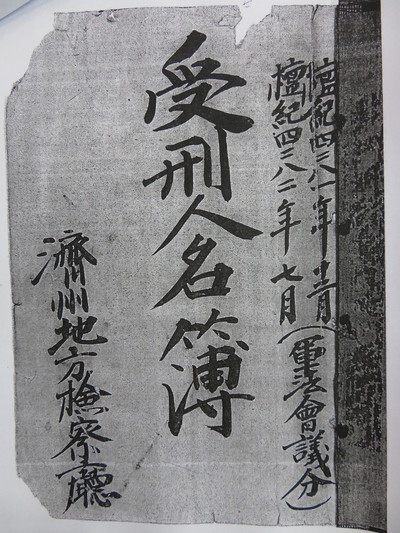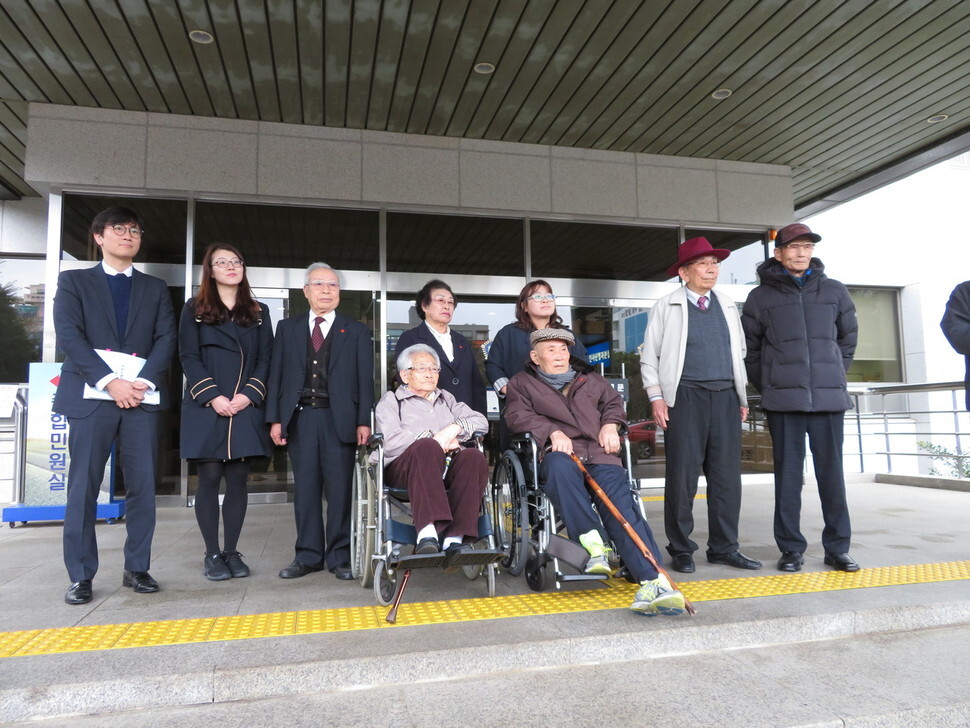hankyoreh
Links to other country sites 다른 나라 사이트 링크
Court weighs question of granting retrials for those imprisoned during 1948 Jeju Uprising

The greatest obstacle to the request for a retrial by the former inmates who were sentenced to prison and incarcerated by military tribunals during the 1948 Jeju Uprising is the fact that the tribunals did not issue written judgments. The original court’s decision is necessary for a guilty verdict to be reviewed in a retrial, but the tribunal did not follow legal protocol and did not even compose a written decision. As a result, the key question that must be answered before holding a retrial is whether the inmate registry, which is the only official document from the trial, is sufficient to verify that the trial occurred.
During the second hearing about a request for a retrial made by inmates during the Jeju Uprising at the Second Criminal Division of the Jeju District Court, presided by Hon. Jegal Chang, on Mar. 19, Kim Jong-min, a former expert member of the National Committee for Investigation of the Truth about the Jeju 4.3 Events, took the stand to testify about the inmate registry. The inmates in question were incarcerated at 14 different prisons around the country, including ones at Incheon, Daejeon and Daegu, following military tribunals in Dec. 1948 and July 1949.
[%%IMAGE1%%]
The only documents connected with the Jeju Uprising inmates that had survived were their depositions. But in 1999, Choo Mi-ae, then a lawmaker with the National Congress for New Politics, released an officially verified inmate registry that she had received from the National Archives of Korea. The inmate registry lists the names, addresses, verdicts, date of sentencing and assigned prison for a total of 2,530 individuals, including 871 charged with rebellion under Article 77 of the Criminal Code in the military tribunal held in Dec. 1948, and 1,659 charged with espionage under Article 33 of the National Defense and Security Act in the military tribunal held in July 1949.
“The military tribunals that took place in 1948 and 1949 cannot be regarded as [legitimate] trials that followed the standard protocol stipulated in the law,” said Kim after taking the witness stand. Kim said that the inmate registry “was apparently handed over to the Jeju District Prosecutors’ Office when the soldiers withdrew and then transferred to the National Archives of Korea for storage since the prosecutors were not allowed to destroy it and had no reason to keep it themselves.”
“While wrong names and legal domiciles are listed for some of the 2,530 people in the inmate registry, most of them are consistent with the actual depositions. Therefore, this record demonstrates the existence of a trial,” Kim said.
During the first hearing that was held in February, the judge said, “Some scholars contend that the inmate registry was fabricated after the fact. The question is whether it is possible to request a retrial based on this inmate registry.”

The military tribunal’s judgments for the Jeju Uprising inmates are not stored at any state institution, and it is unclear why the documents do not exist. One suggestion is that the decision was never composed at all, since, as was noted previously, the military tribunals at the time did not follow basic legal protocol. If the court accepts the credibility of the inmate registry under these circumstances, it will be more likely to rule that the military tribunals were actually held.
During an interpellation session before the National Assembly on Feb. 7, Justice Minister Park Sang-ki addressed the military tribunals during the Jeju Uprising. “An inmate registry exists, but it does not appear that the military tribunals were held in accordance with legal protocol. As such, they cannot be seen as normal trials,” Park told lawmakers.
The petitioners’ attorneys argue that the Jeju Uprising inmates, who were convicted under military tribunals that did not even possess the trappings of a legitimate trial, should be given an opportunity to have their cases retried by a court.
By Kim Min-kyung, staff reporter
Please direct questions or comments to [english@hani.co.kr]

Editorial・opinion
![[Column] Park Geun-hye déjà vu in Yoon Suk-yeol [Column] Park Geun-hye déjà vu in Yoon Suk-yeol](https://flexible.img.hani.co.kr/flexible/normal/500/300/imgdb/original/2024/0424/651713945113788.jpg) [Column] Park Geun-hye déjà vu in Yoon Suk-yeol
[Column] Park Geun-hye déjà vu in Yoon Suk-yeol![[Editorial] New weight of N. Korea’s nuclear threats makes dialogue all the more urgent [Editorial] New weight of N. Korea’s nuclear threats makes dialogue all the more urgent](https://flexible.img.hani.co.kr/flexible/normal/500/300/imgdb/original/2024/0424/7317139454662664.jpg) [Editorial] New weight of N. Korea’s nuclear threats makes dialogue all the more urgent
[Editorial] New weight of N. Korea’s nuclear threats makes dialogue all the more urgent- [Guest essay] The real reason Korea’s new right wants to dub Rhee a founding father
- [Column] ‘Choson’: Is it time we start referring to N. Korea in its own terms?
- [Editorial] Japan’s rewriting of history with Korea has gone too far
- [Column] The president’s questionable capacity for dialogue
- [Column] Are chaebol firms just pizza pies for families to divvy up as they please?
- [Column] Has Korea, too, crossed the Rubicon on China?
- [Correspondent’s column] In Japan’s alliance with US, echoes of its past alliances with UK
- [Editorial] Does Yoon think the Korean public is wrong?
Most viewed articles
- 1‘We must say no’: Seoul defense chief on Korean, USFK involvement in hypothetical Taiwan crisis
- 2N. Korean delegation’s trip to Iran shows how Pyongyang is leveraging ties with Moscow
- 3Amnesty notes ‘erosion’ of freedom of expression in Korea in annual human rights report
- 4[Column] Park Geun-hye déjà vu in Yoon Suk-yeol
- 5‘Weddingflation’ breaks the bank for Korean couples-to-be
- 6[Reportage] On US campuses, student risk arrest as they call for divestment from Israel
- 7[Editorial] New weight of N. Korea’s nuclear threats makes dialogue all the more urgent
- 8Why Korea shouldn’t welcome Japan’s newly beefed up defense cooperation with US
- 9[Guest essay] The real reason Korea’s new right wants to dub Rhee a founding father
- 10Will NewJeans end up collateral damage in internal feud at K-pop juggernaut Hybe?